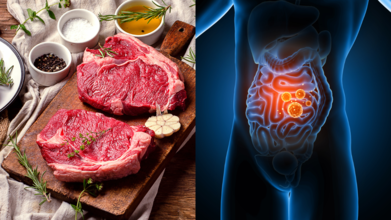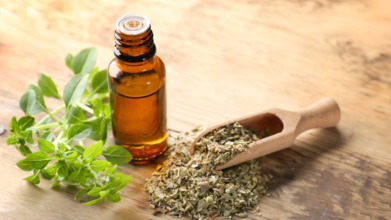- Health Conditions A-Z
- Health & Wellness
- Nutrition
- Fitness
- Health News
- Ayurveda
- Videos
- Medicine A-Z
- Parenting
- Web Stories
Is Dairy The Reason You’re Having Nightmares? Science Says Maybe

Credits: Canva
The connection between your plate and your pillow might be stronger than you think. While most sleep advice focuses on screen time, stress levels, and bedtime routines, a growing body of research suggests that what you eat—particularly before bed—can significantly affect not only how well you sleep but even the kinds of dreams you have. And in a surprising twist, one of the biggest culprits might be sitting in your refrigerator: dairy.
From cheesy nightmarish tales of yore to contemporary arguments over late-night munching, the question lingers: Do dinner plates actually control dreams? A recent study released in Frontiers in Psychology brings new evidence to this classic question, with a look at how dairy and other food influences sleep quality and dream patterns, particularly in young adults.
In one recent study with more than 1,000 college-age subjects from Canada's MacEwan University, researchers discovered that 40.2% of those surveyed said their diet had a noticeable effect on the way they slept. Even more specifically, roughly 25% indicated certain foods made their sleep worse, and almost 20% said other foods improved their sleep. As far as nightmares went, desserts and dairy had the highest guilty ratings—sweets were responsible for 31% of nightmare complaints, and dairy wasn't far behind with 22%.
Significantly, these were not solitary findings. Individuals with documented food sensitivities, especially lactose intolerance, experienced greater quantities of gastrointestinal symptoms that appeared to correlate with poor sleep and more frequent nightmares. The worse the gastrointestinal symptoms, the worse the nightmares in terms of how distressing and vivid.
Why Dairy Might Be Wreaking Havoc at Night?
So, what’s the science behind this? According to Dr. Tore Nielsen, lead researcher and professor of psychiatry at the University of Montreal, there’s a likely explanation rooted in how our bodies respond to dairy. For individuals with lactose intolerance, consuming milk, cheese, or yogurt can trigger bloating, cramping, gas, and indigestion—symptoms that don’t magically disappear once you’re asleep.
When the body is working through gastrointestinal upset during the night, it can contribute to restlessness during sleep, lighter sleep stages, and more frequent awakenings—all of which have been proven to increase dream recall and vividness. This, in turn, can make bad dreams or nightmares more real and memorable. Anxiety, another frequent reaction to discomfort caused by food, is perhaps also responsible for the rise in bad dreams among participants.
When participants were asked about foods most frequently associated with bad sleep, desserts and sweets, spicy food, and milk, yogurt, and cheese ranked atop the list. In contrast, fruits, herbal teas, and vegetables were most frequently attributed to improved sleep.
The most interesting part of the study, however, was its examination of dreams. 5.5% of the participants reported that food impacted their dre
The notion that food influences dreams is not novel. A 2015 study, for instance, discovered anecdotal evidence that cheese and other dairy foods were associated with unusual or vivid dreams. That said, this newer research is the first to explicitly investigate the mechanisms behind such effects, hypothesizing lactose intolerance as a potential trigger, as opposed to dairy per se.
Even so, professionals are hesitant to make decisive conclusions. The subjects for the study were all psychology students—potentially introducing bias by way of their educational experience with sleep and dream research. In addition, the information was self-reported, which is always likely to bias findings. Even so, however, despite these shortcomings, the relationship between food-based symptoms and disrupted sleeping patterns is an intriguing argument for further research.
Foods That Help or Harm Sleep
Though most frequently accused of causing nightmares and bad sleep were sweets and dairy, other foods had beneficial influences. Participants attributed fruits, herbal teas such as chamomile and lemon balm, and vegetables to improved quality of sleep. These are less demanding on digestion and may induce relaxation, which can facilitate healthy sleep patterns and better dreams.
Conversely, spicy foods, saturated and salty foods (such as pizza, burgers, and fried chicken), and caffeinated or sweet beverages were also found to be linked to disturbed sleep and worse dream experiences.
Although dairy has been the main event in this research, it wasn't the sole food group linked to bad sleep or nightmares. Spicy meals and sweet desserts were also frequently culprits. Such foods have the potential to raise core body temperature, interfere with digestion, or cause a spike in blood sugar—each of which can affect how restful you sleep and how often you wake at night.
Conversely, participants reported improved sleep quality with the consumption of herbal teas, fruits, and vegetables. These findings align with existing nutritional science, which supports a plant-forward, low-inflammatory diet for optimal sleep.
How to Eat for Better Sleep and Dreams?
If you're having unusual or disturbing dreams and suspect that your diet is involved, the answer isn't necessarily to eliminate dairy foods altogether. Rather, you can try it as an experiment in personal health and sleep cleanliness. Although the science is continuing to develop, there are evidence-based measures that you can take in order to reduce the likelihood of food-related sleep disturbances and nightmares:
- Have dinner 2 to 3 hours before going to bed so that your body has time to digest.
- Don't eat spicy foods, drink alcohol, or consume caffeine near bedtime, as they will interfere with sleep.
- Don't overdo fast foods and foods with saturated fat and salt at night.
- Make meals balanced with protein, healthy fats, and complex carbohydrates—satisfying, but not too full.
- Select simple-to-digest bedtime snacks like nut butter and fruit, trail mix, or hummus with crackers or vegetables.
- Maintain a food and sleep diary to monitor patterns between what you consume, your nighttime dreams, and your quality of sleep.
- Drink water or non-caffeinated herbal teas to stay hydrated, but avoid sugary or carbonated beverages in the evening hours.
While there is still much we don't know about the connection between food, sleep, and dreaming, preliminary research indicates that what you're eating before bedtime is influencing your dream life more than you may want to think. So next time you grab that late-night cheese plate or cone of ice cream, think about more than just your stomach but your subconscious.
Beef, Pork, and Lamb Might Do More Than Fill You Up; Study Finds They Could Be Flaring Up Your Gut

Credits: Canva
Gaining weight by eating too many lamb chops or beef burgers is not the only risk. A new study published in Molecular Nutrition & Food Research suggests that red meat might be less of a comforting indulgence and more of a gut irritant. According to researchers at Capital Medical University in China, diets overloaded with pork, beef, or mutton could stoke inflammation inside the digestive system, potentially worsening gut-related disorders.
The Experiment
Scientists turned to an animal model. Mice were fed a diet high in red meat before being given a chemical that induces colitis, a condition that resembles inflammatory bowel disease (IBD) in humans. Results showed that the red-meat-fed mice experienced significant weight loss, shorter colons, and visible tissue damage. Their immune systems also went into overdrive, flooding the gut with inflammatory cells. Essentially, the study found that when the gut is already irritated, red meat makes the fire burn hotter.
All Red Meat Counts
Before you point fingers at beef or lamb individually, the researchers clarify that the issue is not with one specific type of red meat. The effect was observed across the board, whether it was pork, beef, or mutton. The common thread was the way red meat in general seemed to intensify inflammatory signals in the gut.
Gut Bugs in Trouble
One of the most striking findings was how red meat tampered with the gut microbiome—the trillions of tiny organisms that work quietly to regulate digestion and immunity. In the study, mice on red meat lost beneficial bacteria, particularly those that protect the gut lining and keep inflammation low. In their place, harmful microbes took over, making the digestive tract more vulnerable.
Why This Matters for Humans
While the experiment was done in mice, the implications for humans are worth paying attention to. People with conditions like Crohn’s disease or ulcerative colitis often report flare-ups after eating red meat. The study offers a possible explanation for this: the combination of heightened inflammation and a disrupted microbiome makes the gut more sensitive. For those already battling IBD, red meat might be less of a protein-packed friend and more of a troublemaker.
The Moderation Mantra
Does this mean you should swear off meat forever? Not necessarily. The researchers were clear that the study does not prove red meat directly causes IBD or that it should be completely eliminated from your plate. Instead, moderation seems to be the golden rule. If you do enjoy red meat, balance it out with plenty of fibre, fruits, vegetables, and lean proteins such as fish or chicken. A varied diet gives your gut a better chance of staying healthy and less inflamed.
Handle with Care
Red meat has long been under scrutiny for its links to heart disease and cancer risk, and now gut health joins the list of concerns. While more human studies are needed, the findings serve as a gentle nudge to reconsider how often you pile your plate with steak or kebabs. Your gut microbiome is like a delicate ecosystem. Treat it kindly, and it will return the favour.
Can Bananas Help You Build Muscle, Improve Digestion, and Gain Weight the Healthy Way?

Credits: Canva
When it comes to healthy eating, bananas often get underestimated. We usually treat it as a quick snack, but rarely do we stop to appreciate just how powerful this fruit can be. Bananas are not just about curbing midday hunger pangs; they can help you gain weight the right way, support muscle recovery, and even improve digestion.
The Banana as a Natural Energy Bar
“Banana is one of the high-protein fruits. It is also called a natural energy bar because of its rich nutrient profile,” says Nutritionist Anushi Jain. She explains that bananas act as both a quick energy source and a way to sustain fullness for longer periods.
That is because bananas are packed with carbohydrates, dietary fibre, and natural sugars like glucose, fructose, and sucrose. Together, these make bananas an effective food for anyone looking to put on weight in a healthy manner. But it is not just calories that make them special. Bananas also deliver a solid dose of potassium, vitamin B6, magnesium, and antioxidants, all of which contribute to overall health while promoting muscle recovery.
Calories That Count
One of the simplest reasons bananas work well for weight gain is their calorie content. A single medium banana provides around 100–120 calories, making them a convenient way to bump up your daily intake. But the real magic happens when you pair bananas with protein and healthy fats.
“When combined with foods like nut butters, milk, or seeds, bananas become a balanced meal that supports both muscle building and gradual, healthy weight gain,” adds Jain. In other words, instead of relying on protein powders or supplements, you can simply slip bananas into your everyday meals for better results.
Bananas and Better Digestion
Bananas do not just help you add calories; they also help you use them well. “Bananas are high in calories and important nutrients like potassium, vitamin B6, and fibre. They also help with digestion, making it easier for the body to absorb nutrients,” explains Dr Shabana Parveen, Head of Dietetics at Artemis Hospitals.
This means that adding bananas to your diet is not just about eating more but also about ensuring your body makes the most of the food you consume. Proper digestion is the backbone of healthy weight gain, and bananas play a quiet but crucial role here.
Easy Ways to Add Bananas Into Meals
Another reason bananas are a favourite among nutritionists is their versatility. They do not demand elaborate recipes or complicated meal prep. “Bananas slip into meals effortlessly,” says Jain.
Here are some easy ways to make the most of them:
- Smoothies: Blend bananas with milk, nut butter, oats, or seeds to create a calorie-dense shake that doubles as breakfast or a post-workout booster.
- Breakfast Bowls: Layer sliced bananas over oatmeal, porridge, or yoghurt for extra creaminess and a burst of energy.
- Nut-butter Pairing: Spread peanut or almond butter on banana slices for the perfect protein-fat-carb combo.
- Desserts: Use mashed bananas in muffins, pancakes, or healthy energy bars as a natural sweetener.
- Post-workout Snack: Pair bananas with whey protein or nuts to replenish glycogen and aid muscle repair.
- Frozen Treats: Blend frozen bananas into a creamy, guilt-free ice cream substitute.
“Bananas are a healthy choice for people who want to gain weight without eating processed foods,” Dr Parveen points out. Whether you mix them into shakes, mash them into bakes, or simply pair them with a handful of nuts, bananas deliver nutrition in the simplest, tastiest form.
Big Benefits
Can bananas help you build muscle, improve digestion, and gain weight the healthy way? The answer is a resounding yes. They are calorie-rich yet wholesome, versatile yet fuss-free, and packed with nutrients that go beyond just filling you up.
Both Jain and Dr Parveen agree that when combined with other nutrient-dense foods and regular exercise, bananas can become a powerful ally in your health journey. Whether your goal is to bulk up, repair muscles, or just keep your gut happy, the next time you reach for a snack, you might want to think banana.
Is Oil Of Oregano Really A 'Magic Cure'?

Credits: Canva
Oil of oregano, also known as oregano oil, is a concentrated extract derived from the leaves of the oregano plant. Typically available in liquid drops or capsule form, it has long been promoted for its potential health benefits, particularly during cold and flu season. Some people dilute it in water or juice, while others add it to their supplement routine.
For centuries, oregano oil has been praised in traditional remedies for its antimicrobial and immune-supporting properties. Modern studies suggest that compounds like carvacrol and thymol found in the oil may help fight certain bacteria, fungi and viruses, at least in laboratory and animal studies.
But experts caution against overestimating its power. As USA Today quotes Mascha Davis, MPH, RDN, a registered dietitian and nutritionist, “While oil of oregano can be part of a short-term wellness strategy, it’s not a magic cure-all.” Much of the evidence so far has not been tested in humans, making it difficult to draw strong conclusions about its effectiveness.
Why Was It Believed To Be A 'Magic Cure'?
Oregano has long been associated with Romans and Greeks and is said to trace back as early as 3000 BC, when it was used by Assyrians. It has been used in folk medicine for over many centuries and is extracted from the leaves of oregano. In the Middle Ages, the plant was considered a magic herb that could ward off witches and even the devil himself. This is why the oil extracted from it earned its name as the 'Magic Cure'.
Also Read: ‘Drink Castor Oil To Cleanse Your Colon,’ Says Sadhguru, But Science Isn’t Convinced
What It Can and Can’t Do
Research shows oregano oil does have antimicrobial and antioxidant properties, but clinical trials on humans remain limited. Benefits linked to digestion or immunity have largely been observed outside the human body, in cell or animal studies.
Who Should Avoid It
Despite its popularity, oil of oregano isn’t safe for everyone. Davis also advises that those who are iron deficient, pregnant, breastfeeding, allergic to mint, or taking certain medications, such as blood thinners or drugs for diabetes, should avoid it unless directed otherwise by a healthcare provider.
Even healthy individuals should use it with caution. Because it’s highly concentrated, taking too much or using it without dilution may irritate the gut lining. Experts recommend using it sparingly and only for short durations, such as a few days to a week, while closely following dosage instructions.
Read: The Truth About Cooking Oils: Which One Should You Really Use?
The Bigger Picture
Relying on oregano oil alone for long-term health isn’t sustainable. Experts emphasize that proven habits, like eating a nutrient-dense, plant-based diet, getting quality sleep, managing stress, and incorporating probiotics, are more effective for maintaining immunity and gut health in the long run.
The takeaway? Oil of oregano may have its place as a short-term supplement, but it’s not the all-in-one remedy it’s often marketed to be.
Read More: Common Cooking Oil Ingredient May Cause Your Breast Cancer
© 2024 Bennett, Coleman & Company Limited

